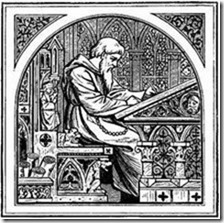 Homily from Father Alex McAllister SDS
Homily from Father Alex McAllister SDS
Palm Sunday
Posted for March 29, 2015
Scholars tell us that what we have just heard is the oldest written account of the passion and death of Jesus. So by reading it in dramatic form as we have just done we are able to get very close to those most significant of all events in the history of the world.
A few days ago when I was reading the various texts of today’s mass I was struck by the similarity between the account of getting the donkey for the ride into Jerusalem, that we had at the beginning of the mass, with the account of the preparations made for the Passover feast.
In both cases it seems as though Jesus had made some private arrangements without the knowledge of his disciples. He had made prior provision for the donkey to be there ready for his entry into Jerusalem and he had already booked a suitable room in which he could hold the Last Supper.
So these were not spontaneous events. Jesus knew what he was doing. We should be quite clear that Jesus was entirely aware of what was going to happen and he deliberately accepted the Father’s will.
I’d also just briefly like to draw your attention to the meal at Bethany right at the beginning of the account of St Mark’s Passion. It is often overlooked.
This meal we are told took place two days before the Passover and so you could regard it is a sort of pre-Last Supper. At this meal in the house of Simon the Leper a woman anoints his feet with expensive oil. We generally assume that this woman is Mary Magdalene who is named in a similar account in the Gospel of John but Mark has her simply as an anonymous woman.
This anointing occurs at a very significant moment, after Jesus’ entry into Jerusalem and immediately prior to his arrest and crucifixion. The whole point of Jesus’ entry into Jerusalem is that he is revealing himself as the Messiah. The word Messiah in Hebrew or Christ in Greek literally means ‘the anointed one’ —well here you have the anointing!
But like everything else in the life of Jesus things are turned upside down. This anointing breaks all the rules. It is not in a royal palace it is in the house of a leper. It is not done by the High Priest but by an anonymous woman. There is no acclamation at the fitness of this wonderful action but instead Jesus’ closest disciples are totally unaware of its significance and get annoyed with the woman for wasting the expensive ointment.
As if to underline the point even more, Mark brackets the incident with two betrayals: one the plotting of the Chief Priests and the Scribes and the other the betrayal by Judas.
Christ himself, however, proclaims the appropriateness of the woman’s action. He says, ‘She has anointed my body for its burial.’ Again things are upside down. A Messiah is anointed and comes into his own when he is enthroned not when he is buried.
This short prelude to the events of the Passion and Death of Jesus deserves to be studied closely and prayed about deeply. It entirely typifies the paradoxical nature of the Kingdom Christ came to inaugurate.
His Kingdom is a Kingdom of truth, justice and peace. It is a Kingdom based on the Beatitudes. It is a Kingdom in which the poor and the disregarded are raised to the highest positions. It is a Kingdom based on love not power. It is a Kingdom in which Simon the Leper and Mary Magdalene are quite at home. It is a Kingdom which the likes of the Chief Priests and the Scribes see as a threat and do all in their power to undermine.
This is the Kingdom we aspire to and it is this Kingdom we will see inaugurated during the events of this Holy Week.
http://www.catholicwealdstone.org/wordpress/?p=2057
Digest of Articles from Catholics Blogs and Websites
March 29, 2015
Palm Sunday, Year B—March 29, 2015
In our Lenten journey, have we discovered that we are studies in contrasts? Did we begin with great aspirations and are now feeling more than ever our fickleness? If so, we are truly ready for Palm Sunday.
Gospel (Read Mark 14:1-15:47)
Today, in the universal Catholic Church, we rise during Mass to hear a full reading of the Passion of Christ. What is our disposition today, having spent nearly 40 days praying, fasting, and doing acts of generosity? Most of us start Lent with some sense of seriousness about our relationship with God. We welcome a whole season in which we seek to know and love Him better. Is that happening? Are the results mixed?
…more
Palm Sunday of the Lord’s Passion: Don’t Keep the Secret
(This is a brief homily for after the Proclamation of the Passion. In my parish I would follow this with calling the people to join us in prayer on Holy Thursday, Good Friday and the Solemn Easter Vigil).
Today’s Proclamation of the Passion was from the Gospel of Mark. This is the Gospel that often presents crowds of people pressing on Jesus to be healed. Jesus heals many people in this Gospel, but he then he directs them, “Tell no one about this.” Jesus silences devils who call out from the possessed that they know who He is. Why? Why the secrecy? Why does Mark present what scripture scholars would call, the Messianic Secret? The message behind the secret is that no one can understand the healings or the Messiah until they understand the cross.
